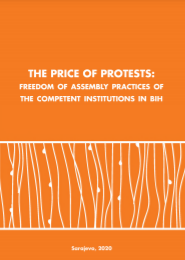The Price of Protests: Freedom of Assembly Practices of the Competent Institutions in BiH
The Price of Protests: Freedom of Assembly Practices of the Competent Institutions in BiH
Author(s): Ajla Škrbić
Contributor(s): Mariña Barreiro Mariño (Editor), Emina Bošnjak (Editor), Aida Spahić (Translator)
Subject(s): International Law, Human Rights and Humanitarian Law, Civil Society, Public Law, Evaluation research
Published by: Sarajevo Open Centre
Keywords: BiH; freedom of assembly; institution practices; legislation; organization of assembly; notification; banning public assemblies; authorities; human rights;
Summary/Abstract: This Report analyses the right to freedom of assembly, with a focus on practices of the competent authorities: the ministries of the interior in the cantons of the Federation of Bosnia and Herzegovina and the Republika Srpska, and the Police of Brčko District. The practice of other actors in Bosnia and Herzegovina has also been researched, those competent to decide on the exercise of the right to assembly (ministries of transport, municipal bodies, private persons). Although the focus is on practice, positive regulations pertaining to notifications and the possibility of banning assemblies have also been analysed, as well as their compliance with international standards. The main goal of the research was to determine whether the practice of the institutions in Bosnia and Herzegovina is restrictive with respect to the right to freedom of assembly and what are the challenges that assembly organisers face. The research covered the entire territory of Bosnia and Herzegovina in the time period from 1 January 2017 until 31 December 2019. The results of the research indicate that the number of public assemblies in Bosnia and Herzegovina is growing, as is the number of their participants. Legislation, however, differs in different parts of Bosnia and Herzegovina, with the common characteristic that it is not in line with international standards. Poor legislation, its poor application in practice and the large discretion granted to actors in this field lead to restrictions and discrimination in the exercise of the right to public assembly in Bosnia and Herzegovina. Practices of the authorities vary depending on assembly purpose, i.e., they are restrictive where assemblies tend to criticize the local government or focus on the rights of women and LGBTI people. Therefore, it is necessary to align domestic laws throughout the country, to harmonize them with international standards and to continuously train state authorities with respect to international standards in this field and their application. In view of the above, this Report makes recommendations for the development of a quality framework for the exercise of the right to freedom of assembly in Bosnia and Herzegovina, in line with international standards.
Series: SOC - Ljudska prava
- Page Count: 44
- Publication Year: 2020
- Language: English
- Introduction
- Content File-PDF

